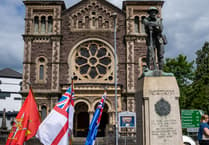Oh God Our Help in Ages Past
Everyone likes to sing along with gusto to the hymns sung around Abergavenny’s war memorial on Sunday morning, but remembering all the words to all the verses of the hymns can be a challenge and often hymn sheets are few and far between so why not grab your phone and use our mobile hymn sheet and never miss a word again!
Oh God, Our Help in Ages Past
Oh God, Our Help in Ages Past is a hymn by Isaac Watts in 1708 that paraphrases the 90th Psalm of the Book of Psalms. It originally consisted of nine stanzas; however, in present usage the fourth, sixth, and eighth stanzas are commonly omitted to leave a total of six. In 1738, John Wesley in his hymnal, Psalms and Hymns, changed the first line of the text from "Our God" to "O God". Both Watts' original text and Wesley's rewording remain in current use
O God, our Help in ages past,
our Hope for years to come,
our Shelter from the stormy blast,
and our eternal Home.
Under the shadow of Thy throne
Thy saints have dwelt secure;
sufficient is Thine arm alone,
and our defense is sure.
Before the hills in order stood,
or earth received its frame,
from everlasting Thou art God,
to endless years the same.
A thousand ages in Thy sight
are like an evening gone,
short as the watch that ends the night
before the rising sun.
Time, like an ever-rolling stream
bears all its sons away;
they fly forgotten, as a dream
dies at the op’ning day.
O God, our Help in ages past,
our Hope for years to come,
be Thou our Guard while life shall last,
and our eternal Home!
Oh Valiant Hearts
"O Valiant Hearts" is a hymn remembering the fallen of the First World War. It often features prominently in annual Remembrance Day services in the United Kingdom and the British Commonwealth.
Words were taken from a poem by Sir John Stanhope Arkwright (1872–1954), published in The Supreme Sacrifice, and other Poems in Time of War (1919)
It was set to music by the Rev. Dr. Charles Harris (1865-1936) who was Vicar of Colwall, Herefordshire between 1909-1929 and it is to his tune, referred to as Harris or sometimes The Supreme Sacrifice that the hymn is now almost always sung.
O valiant hearts who to your glory came
Through dust of conflict and through battle flame;
Tranquil you lie, your knightly virtue proved,
Your memory hallowed in the land you loved.
Proudly you gathered, rank on rank, to war
As who had heard God’s message from afar;
All you had hoped for, all you had, you gave,
To save mankind—yourselves you scorned to save.
Splendid you passed, the great surrender made;
Into the light that nevermore shall fade;
Deep your contentment in that blest abode,
Who wait the last clear trumpet call of God.
Long years ago, as earth lay dark and still,
Rose a loud cry upon a lonely hill,
While in the frailty of our human clay,
Christ, our Redeemer, passed the self same way.
Still stands His Cross from that dread hour to this,
Like some bright star above the dark abyss;
Still, through the veil, the Victor’s pitying eyes
Look down to bless our lesser Calvaries.
These were His servants, in His steps they trod,
Following through death the martyred Son of God:
Victor, He rose; victorious too shall rise
They who have drunk His cup of sacrifice.
O risen Lord, O Shepherd of our dead,
Whose cross has bought them and Whose staff has led,
In glorious hope their proud and sorrowing land
Commits her children to Thy gracious hand.
All People That on Earth Do Dwell
A favourite hymn of Queen Elizabeth II 'All People that on Earth do Dwell' was written by Scotsman William Kethe in the 16th century after he was inspired by Psalm 100. Protestant Kethe fled to the continent during the prosecution of protestants in the reign of Queen Mary I. The hymn , often known as The Old Hundreth, was sung at the coronation Queen Elizabeth II in 1953 as well as other royal occasions and celebrations.
All people that on earth do dwell,
sing to the Lord with cheerful voice;
him serve with fear, his praise forth tell,
come ye before him, and rejoice.
The Lord, ye know, is God indeed;
without our aid he did us make;
we are his folk, he doth us feed,
and for his sheep he doth us take.
O enter then his gates with praise,
approach with joy his courts unto;
praise, laud, and bless his name always,
for it is seemly so to do.
For why? the Lord our God is good;
his mercy is for ever sure;
his truth at all times firmly stood,
and shall from age to age endure.
To Father, Son, and Holy Ghost,
the God whom heaven and earth adore,
from men and from the angel-host
be praise and glory evermore.
Amen.
Eternal Father strong to save
Eternal Father strong to save
Whose arm has bound the restless wave
Who bids the mighty ocean deep
It's own appointed limits keep
O hear us when we cry to Thee
For those in Peril on the sea
Oh Christ whose voice the waters heard
And hushed their raging at Thy word
Who walkest on the foamy deep
And how amidst the storm did sleep
O hear us when we cry to Thee
For those in Peril on the sea
Eternal Father strong to save
Whose arm has bound the restless wave
Who bids the mighty ocean deep
It's own appointed limits keep
O hear us when we cry to Thee
For those in Peril on the sea
Oh Christ, the Lord of hill and plain
O'er which our traffic runs amain
By mountain pass or valley low
Wherever, Lord our brethren go
Protect them by Thy guarding hand
From every peril on the land
O Spirit, whom the Father sent
To spread abroad the firmament
Oh wind of heaven, by Thy might
Save all who dare the eagle's flight
And keep them by thy watchful care
From every peril in the air
O Trinity of love and power
Our brethren shield in danger's hour
From rock and tempest, fire, and foe
Protect them wheresoe'er they go
That evermore shall rise to Thee
Glad praise from air and land and sea



